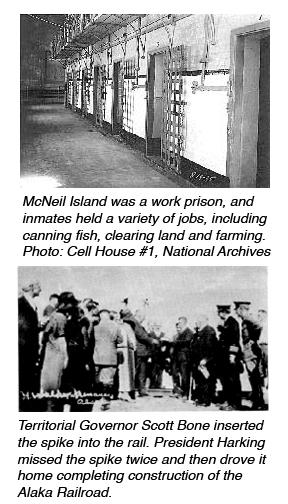Part 5 Doing Time: A Letter Campaign
Part 5 Doing Time: A Letter Campaign
Doing Time: A Letter Campaign

Dempsey was sent to McNeil Island to begin his sentence, and was then transported to Leavenworth, Kansas, in March 1921. In time, Dempsey tried to educate himself in law, real estate, finance and English grammar.
In 1923, he began his campaign to gain freedom. He directed his early letters to Alaska Gov. Scott Bone, a former Seattle newspaperman who was unfamiliar with the case. He received no help. By 1926, Dempsey began to badger Bunnell, who had then accepted the post as president of the Agricultural College and School of Mines. Dempsey asked Bunnell to make reccommendations for clemency, which Bunnell denied.
Dempsey wrote again, arguing that he was barely 20 years old at the time of trial and totally ignorant of "our National Laws and their meaning . . ." He maintained that he was convicted of shooting Evans because of "the bond of friendship you and Mr. Munley, as well as the other court or law officials had for Isaac Evans..." Furthermore, he said Dimond was not qualified to represent him in a criminal case because of his lack of experience.
With a guilty verdict in the Evans case, the "same being equivalent to a death sentence, I lost all interest in my second trial," he wrote, "and believed it little mattered if I was convicted for her death, too or even a hundred similarily additional charges."
Dempsey believed if he had been tried for the Lavor murder first, "I could have easily proved my innocence, i.e. before a Fair and Unprejudiced Jury and Court." As an example of his earnestness, Dempsey said he had many opportunities to escape before and during the trials, but did not. He did not want to "resort to violence of a fatal nature," nor did he want to hurt his image in the eyes of his mother. He had used an alias to "shield my parents and relatives from the shame and humiliation of my arrest." Knowing his mother believed him incapable of committing these crimes, he did not permit his associates to free him. For had they done so, this would have taken lives and forever branded him "as a real murderer in her mind."
He admitted killing Evans, but only in self defense. As for Lavor, Dempsey claimed that one of the men present "at the party-brawl where she had been fatally wounded is now married and has a family; is leading a legitimate career and respected in his whole community." He would not divulge the name, as Bunnell requested, for it would destroy the man's life.
With these facts in mind, Dempsey urged Bunnell to help him gain freedom, for if kept in prison many years more, he wrote, he would become "calloused to human emotions, adamant, devoid of tender human sentiments and become a menace to not only myself but all Gentle Organized Society. This future, good or bad, lies in the hollow of your hand, to do with as you please."
Dempsey concluded that the Bible stated to "'Do unto others as you would want done unto you.' You undoubtedly are a Christian, if so, prove your worthiness of its term or name."
Dempsey's arguments for his innocence were not convincing, and he continued to pester Bunnell. On June 30, 1926, Bunnell wrote back, telling Dempsey he found his correspondence to be critical "of everyone having to do with your affairs with the exception of yourself," and refused to recommend clemency "unless there is presented to me some good reasons."
Dempsey had killed two people, and it seemed to Bunnell that "society is best protected by keeping you where you are. Men do not have to be at large in order to be good men. You were not a benefit to society or yourself when you were at large." He reminded Dempsey to be grateful to have escaped death.
The prisoner did not give up, however, and continued to badger Bunnell for a recommendation for clemency. He also asked various acquaintances to contact Bunnell and persuade him. Bunnell refused, and became increasingly uneasy over Dempsey's continued efforts to gain freedom.
